|
Better Late than
Never
There was a time, in the 1960s and 70s
when the appearance of a new Desmond Bagley thriller in paperback prompted a
run on the bookshops almost entirely fuelled, in those pre-internet days, by
word of mouth recommendation from fellow fans. I was, in my youth, one of the
first in the queue when a new Bagley appeared in Fontana paperback and I still
have the copy of his 1963 debut The Golden Keel which I bought in
1965. Waiting up to two years for the paperback edition was an important
consideration as hardbacks were between five and six times more expensive and
this keen reader was still at school and without an income. Indeed, I had never
actually seen a hardback copy of that initial Bagley thriller until last month
when I treated myself, 53 years on, to a first edition as an early Christmas
present.
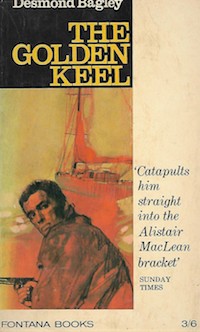 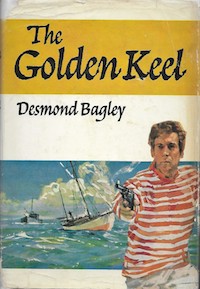
It was an amazing (and genuine)
coincidence that the day after my copy of The Golden Keel arrived, thanks to a
victorious eBay auction, an advance proof copy of Desmond Bagley’s new thriller, Domino Island, arrived
courtesy of publishers HarperCollins.
And yes, you read that right. More than
thirty-five years after the death of Desmond Bagley, a previously unpublished
novel will finally see the light of day. It was a novel which started out as a
‘classic whodunit’ under the working title Because
Salton Died, and its long journey to publication involved a fair amount of
detective work by researcher Philip Eastwood who runs www.thebagleybrief.com, editor Michael Davies and publisher
David Brawn, all of whom, needless to say, are Bagley fans.
Philip Eastwood discovered the first
draft manuscript of Because Salton Died among
the Bagley papers deposited in the Howard Gotlieb Archive at Boston University
in America and, on the title page, a plea from the author: ‘if you can think of
a better [title], please do’.
It was written in 1971 following a
period of “writer’s block” not helped by a brief, but salutary experience in
Hollywood where he was invited to write a screenplay of one of his most popular
thrillers, Running Blind. He
was to say later that ‘Everything you have read about Hollywood is true’ and
that it had been ‘a poor experience’. Possibly to exorcise his Hollywood demons,
Bagley opted to write a whodunit rather than one of his trademark adventure
thrillers, but thankfully you cannot keep a good thriller-writer down and the
basic mystery plot of how and why property magnate David Salton died on the
formerly British Caribbean island of Campanilla develops into a vintage Bagley
scenario of siege, jeopardy and explosive action.
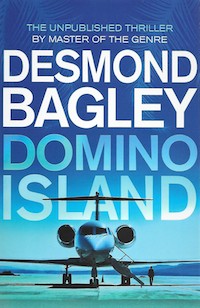
Michael Davies has done an excellent
job as ‘curator’ of that initial first draft, with its themes of political
corruption and a rich elite living on what should be an island paradise but is
in fact floating on a sea of casino money attracting organised crime,
incorporating Bagley’s own notes for a second draft and providing a new
(better) title.
Domino Island will be published in May and will not
disappoint hard-core Bagley fans. It will bring new readers who appreciate
straightforward, honest story-telling, to his backlist. And dare I say that
there are some contemporary thriller writers who could benefit from learning
how one of the masters did it half a century ago?
Resolutions Blown
I really don’t know why I bother making
New Year’s Resolutions. I was firm in my resolve to turn a blind eye to any
book which used the ‘girl walking away’ motif on its cover and almost as solid
was my vow to ignore any new thriller promoted with the rhetorical question How far would you go? In addition, I am
instinctively suspicious of any novel being compared to the over-rated
television series The Bodyguard.

However, I cannot resist Winner
Kills All, out this month from Simon & Schuster, despite its female
walking-away cover (albeit an armed female rather than a vulnerable young girl),
the publisher’s insistence that this is “for fans of BBC’s Bodyguard” and the fact that the first sentence of the Prologue is How far would you go to save a loved one?
I have immediately abandoned the few
principles I claimed to have on the basis that the authors behind the name R.J.
Bailey are none other than husband-and-wife writing team Rob and Deb Ryan,
which is usually a mark of quality, and because the novel mentions the wartime
career of actor Sir Anthony Quayle, who was an SOE agent in Albania (something
I am sure I have read in an authoritative ‘reader’s history’ of British
thrillers). The action of Winner
Kills All moves rapidly from Albania to Bali and south-east Asia and
features former Personal Protection Officer Sam Wylde, who kicks ass and
employs an impressive selection of weaponry in her freelance work, which runs
alongside a very personal quest for her missing daughter.
As an added bonus to the turbo-charged
story, in case anyone doubts the premise of female personal protection
officers, the authors supply a wonderful coda in the form of an article they
wrote for The Times on how they
researched the subject and discovered, as is often the case, that the fact is
stranger than the fiction. I particularly liked the story of the female
protection officer assigned to former Prime Minister Tony Blair whose cover was
blown when she left her Glock pistol in the lavatory of a Starbucks.
Crime Down Under
I have already predicted that the early
months of 2019 will highlight crime-writing talent from Australia. First out of
the blocks is Scrublands by Chris Hammer (Wildfire), with Jane Harper’s
much-anticipated third novel The Lost Man (Little Brown) coming
in early February and Christian White’s The Nowhere Child (HarperCollins)
published in March, although an eBook version has been available for some time.
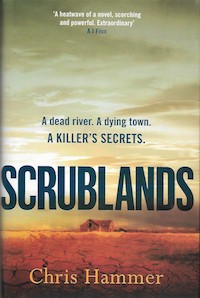
Scrublands is a long (perhaps just a tad too long)
debut novel by journo (as they say down under) Chris Hammer, whose hero is,
naturally, a journo sent to the dying town of Riversend in New South Wales. The
journo, Martin Scarsden, comes with his own experience of PTS syndrome
following an assignment in the Gaza Strip and is trying to revive his career
with a feature on Riversend, the scene, a year ago, of a mass shooting in full
public view by the local vicar!
Scarsden is not an attractive hero,
given to considerable self-introspection about the ethics of journalism and
prone to sulking when he cannot get a decent coffee, and quickly becomes part
of the story rather than reporting it. Although only there for ten days,
ostensibly to find out why the town priest shot five people and then committed
‘suicide by cop’, he quickly seduces one of the priest’s lovers (there were
others), rescues a young tearaway from a car crash, helps fight a bushfire and
then a fire in the town itself, rescues a baby from the clutches of a
psychopath, helps solve the rape and murder of two German back-packers and gets
involved in a security service operation against organised crime.
The town of Riversend, suffering from
drought and economic depression is a grim place and ‘dying on its feet’ would
not be an expression used lightly as the amount of dying thanks to murders (at
least eight) and suicides (two, arguably three?) is considerable, plus there
are underlying themes of blackmail, rape, paedophilia, wife-beating, war
crimes, false identities and that old stand-by, cheating someone out of an
inheritance.
For a debut novel, Hammer has attempted
to keep a lot of plot plates spinning but he does successfully tease out the
solution to the initial mystery of why a gun-toting priest went on a shooting
spree to the very end and provides a riveting read for anyone not planning a
back-packing holiday in New South Wales.
’Prentice Piece
I have had the privilege of bringing
ten thrillers by James Mitchell (1926-2002) back into print and editing two
collections of his short stories, but I had never, until recently, come across
what might be called his (Ap)Prentice Piece A Way Back, published in
1959.

It was Mitchell’s third novel and it
was very much a novel of crime, punishment and redemption (though not
necessarily in that order) rather than a straightforward thriller, although it
does give tantalising glimpses of what were to become Mitchell trademarks: the
north-east or Tyneside backgrounds of his central character (hard man John
Craig in The Man Who Sold Death) and a working-class resentment of those
in ‘authority’ (Callan).
The hero of A Way Back is a
disillusioned left-wing revolutionary
who had been involved in a coup in South America (or possibly Mexico) where a
bomb he planted missed the evil dictator it was intended for and killed
innocent children instead. As a penance, he adopts a new identity, returns to
England and accepts a mind-numbing job in a Tyneside foundry which just happens
to be developing an armour-piercing bomb in its R & D department. After seven years on the factory floor,
union meetings, grotty pubs and living in digs with a Geordie landlady (seven years…!) our hero is approached by
two mysterious figures who know his past and will keep quiet only if he helps
them steal the plans of the new bomb.
The stealing of the plans is tense
enough (and fatal for one participant) but the following pursuit by the security
services and fall-out amongst the villains is far less suspenseful and one
scene in particular where our hero is forced to strip naked at the roadside to
prove he isn’t carrying photographic negatives of the plans, is quite farcical.
A Way Back is not a very thrilling thriller,
although it does provide an interesting picture of working-class life in the
Fifties, and it is a fascinating read if you know what the author is going to
achieve in the following ten years.
Irish (Private?) Eyes
The mean streets of Belfast are on the crime fiction SatNav just at the moment, as I hear of a new novel from Ulster émigré (to Camden Town) Paul Charles, A Day in the Life of Louis Bloom, published by Dufour Editions.

This is the second outing for a new series hero, former cop (now gone private) Brendy McCusker, who is called in to investigate the disappearance of prominent Ulster intellectual Louis Bloom – not, please note, the anti-hero of the film Nightcrawler, nor Dublin’s Leopold Bloom, nor even Leo Bloom, the accountant in The Producers. Soon enough, Louis Bloom turns up dead, appropriately enough in a graveyard, but not before Paul Charles has managed to get in numerous references to Abbey Road, Revolver and Rubber Soul, which is understandable as Paul is long-standing Beatles nut and has a dual career in the music business as well as crime fiction.
Paul’s best-known series is that featuring DI Christy Kennedy, which began in 1997 with the wonderfully-titled I Hear the Sound of Breaking Glass and the good news for fans, I can reveal, is that an eleventh Christy Kennedy novel is now being written.
|
|

In March, the streets of Belfast will echo to screams of terror and outrageous violence if, that is, my experience of international crime fiction festivals is anything to go by. The festival in question is 2019’s Noireland which takes place in Belfast’s Europa Hotel between the 8th and 10th of March, which is just before Brexit, after which the hotel will probably have to be renamed.
I was not expecting to be invited to Noireland, and have not been disappointed, but several genuine stars from the crime fiction firmament have, including Ann Cleeves, Belinda Bauer, Denise Mina and Belfast’s very own Steve Cavanagh. I would happily pay the price of admission to see any of those four in action, but I will be otherwise busy stockpiling prescription medicines, brie, camembert, mature Gouda, Valpolicella ripasso, vin santo, Euros etc, before the 29th March cliff edge.
All in the title
Without doubt the book title which jumped out at me in 2018 was The Siege of Reginald Hill by Corinna Turner, which I believe is a historical fantasy aimed at young adults published by Unseen Books.
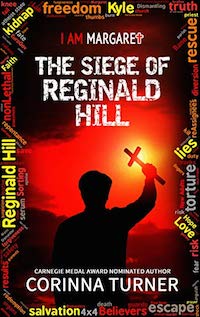
I know nothing of the book other than I am sure the title would have amused my old friend Reg Hill and I can envisage, had he been still with us, that it would have led to a frantic exchange of emails with suggestions for other titles such as The Taking of Rendell 123, Last Seen Keating and Lee Child 44; so on, so forth. It’s a game anyone can play but, as usual, there are no prizes.
When contemplating vast displays of books by other authors, many a writer has thought of Murder in the Bookshop though probably not linking it to the detective story written in 1936 by Carolyn Wells, one of America’s most popular ‘Golden Age’ mystery writers (no, sadly, me neither) and a poet who wrote more than 170 books during a distinguished literary life.
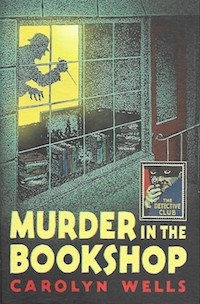
In 1968 that master of the locked-room mystery John Dickson Carr apparently referred to Carolyn Wells (1862-1942) as one of mystery fiction’s ‘lost ladies now well lost’ which may sound pejorative, but I am sure wasn’t meant that way. Murder in the Bookshop, which features Wells’ regular detective Fleming Stone, concerns a murder (naturally) and a missing book (you could have guessed), actually a pretty boring tome on taxation but a book signed and annotated by no less a person than Button Gwinnett (again, me neither).
It is really Button Gwinnett’s autograph which is valuable as he was, as a representative of the rebellious colony of Georgia, one of the signers of the 1776 Declaration of Independence. As Gwinnett was killed in a dual (by a fellow revolting colonist) in 1777, he did not get the chance to sign many other autographs, hence the rarity value of his ‘John Hancock’ (a fellow revolutionary). As a motive for murder, Carolyn Wells was certainly on to something as a letter bearing Button Gwinnett’s signature was sold for more than $700,000 in New York in 2013.
Murder in the Bookshop is published by HarperCollins as part of their Detective Club Classics series and is, amazingly, the fiftieth title to be reissued in these very attractive – and attractively priced – hardbacks.
More Berlin Games
Having ranted unsuccessfully about ubiquitous covers featuring girls-walking-away, I have decided to adopt another obsession to while away the long winter evenings. Back in August I mooted the idea that Berlin was surely the most popular setting for spy fiction and one reader was paying enough attention to contact me and plant the suggestion that Berlin’s famous Brandenburger Tor was in danger of becoming one of the most over-used images on the covers of crime and thriller fiction.

 
I will, of course, be keeping an eagle eye on the matter, and was determined not to let this new delusion replace my long-running campaign on girls-walking-away, when I discovered I could combine my two hobbies.

The cover of The Berlin Affair by David Boyle, published by Endeavour Quill, not only shows the famous 18th century gate in all its glory, but has a female figure holding a red umbrella ‘walking away’.
Books in Prospect
My Boy Scouts’ Diary for 2019 is now up and running, with key days already highlighted (i.e. the publication dates of my new novel and no less than five (5!) new paperback editions, which I may conceivably mention in the course of the year) and I have begun to flag up other important points in the publishing calendar.
April, the cruellest month in many ways, will see the publication of the last Bernie Gunther thriller Metropolis by the late Philip Kerr, a novel I have been anxiously awaiting since I heard – at Philip’s funeral last April – that he had completed the manuscript shortly before his untimely death at the age of 62.
In May, two American heavyweights take centre stage. With his first novel in what must be 14 years, Thomas Harris will no doubt return to the international best seller lists, but as to the subject matter or the title, I have no idea. Harris will be joined on the review pages by James Ellroy whose delayed (from last September) novel set in 1942 California, This Storm, will finally appear.
August will see a new Robert Harris novel, which may or may not be titled The Second Sleep, and I have set time aside in October for a new John le Carré thriller, Agent Running in the Field.
But more immediately, two January titles are taking precedence. Firstly, Battle Sight Zero which is, I believe, Gerald Seymour’s 35ththriller in a 40-year career since he swopped fame as an ITN reporter covering the world’s very hot spots to become a best-selling thriller writer.
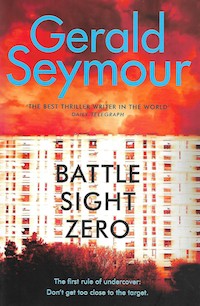
Published by Hodder, Battle Sight Zero follows the history of a particular Kalashnikov assault rifle, from its manufacture in Russia in 1957 to being smuggled into Britain in the 21st century where a terrorist cell plans to make deadly use of it. I am particularly looking forward to this one as it is bang-on up-to-date, the final chapters being set in January 2019, and the locations include Dewsbury in West Yorkshire which admittedly may have changed since I knew it half a century ago, but I do not recall it ever featuring in a thriller before.
Towards the end of January I am sure I will be enjoying Curtain Call by Graham Hurley, published by Severn House, as I am a big fan of his recent thrillers set during WWII. Curtain Call sounds as if it may be a departure (should that be another departure?) for the prolific Graham Hurley who has created a female protagonist (not for the first time) in the shape of Enora Andersson, an Anglo-French actress, who will act as an observer on the state of the British nation just as his much-admired Portsmouth detective Joe Faraday did a decade ago.
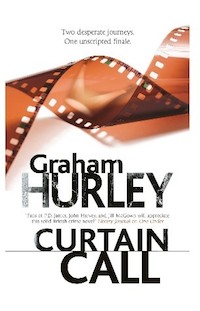
I have made myself a promise to read Graham’s new novel as quickly as possible as I hear that the follow-up, Sight Unseen, is already written. I told you he was prolific.
Last Laugh
I was highly amused to learn that the most popular crime drama in Denmark is not one of their badly-lit, multi-strand Scandi-noirs, but dear old Midsomer Murders which has been slaughtering England’s rural middle-class and straining the suspension bridge of disbelief of viewers since 1997. Shortly to embark on its 21st series, Midsomer Murders enjoys far greater viewing figures in Denmark than such home-grown products as The Killing or The Bridge.
I wonder if that has been taken into consideration in negotiating trade deals post Brexit?
A Happy and Prosperous 2019
(at least until Brexit) to all and sundry,
The Ripster.
|